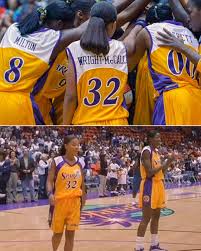Why Love & Basketball Is More Relatable as an Adult
- Juli "Candi" Long
- Nov 19, 2024
- 3 min read
Updated: Dec 23, 2024
A Classic Revisited

Released in April 2000, Love & Basketball, starring Sanaa Lathan and Omar Epps, became an instant classic for many. Directed by Gina Prince-Bythewood, the film tells the story of Monica Wright and Quincy McCall— childhood friends who bond over basketball and life’s growing pains.
At the time, I was a sophomore in high school, and I could definitely relate to the characters. Monica’s drive to prove herself on the court? Quincy’s complicated family drama? Been there. But here’s the thing—teenage me wasn’t a fan. Maybe it’s because Quincy triggered me with his entitlement (seriously, I was not rooting for him back then). Or maybe it’s because the love story felt a little too close to reality, messy and all.
Fast forward to today, though, and my perspective has shifted. Re-watching Love & Basketball as an adult, I can appreciate it in a way I didn’t back then. It’s a raw, honest portrayal of love, ambition, and growing up—showing us that the journey to get it all isn’t always pretty.
Teenage Me vs. Adult Me
As a teenager, I remember feeling irritated by Quincy’s character. He had everything handed to him—natural
talent, his father’s NBA connections, and star treatment everywhere he went. Monica, on the other hand, had to grind for every opportunity, whether it was earning her spot on the women’s basketball team or proving herself in a male-dominated sport. It just didn’t feel fair.
But rewatching as an adult, I can see the deeper layers. Quincy wasn’t just “entitled”—he was a young man
navigating a personal crisis and figuring out how to process his emotions. His father’s betrayal rocked his world, and he wanted Monica, his closest person, to be his safe space.
At the same time, Monica’s choice to stick to her curfew and prioritize her basketball scholarship was the right
one. That moment was a turning point for both of them—Quincy learned what it felt like to not come first, and Monica stood firm in protecting her dream. As much as I sympathize with Quincy’s feelings now, I still believe Monica made the right call.
Relatability and Cultural Impact
Love & Basketball resonates deeply in the African-American community because it shows us in a way we didn’t often see on screen—just living, loving, and chasing dreams. So many films at the time leaned into stereotypes of violence or crime, but this one gave us characters who were ambitious, complex, and relatable.
For me, it hit especially close to home. I was in high school, preparing for college, and navigating relationships as a young adult. I understood Monica’s grind and her sacrifices. I even understood Quincy’s emotional
outbursts, even if they irritated me. Seeing this level of authenticity on screen—Black people just living their lives—was rare and refreshing.
A Happy Ending for the Win
And honestly, who doesn’t love a happy ending? Monica got everything she worked for—her dream career, her man, and an adorable little girl to top it all off. Watching it now, I can’t help but appreciate how the story tied everything together so beautifully.
For young millennials like me, Love & Basketball was more than just a love story—it was proof that you could pursue your dreams and still find love, even if the journey wasn’t perfect. Monica’s resilience and determination were inspiring, and her eventual happiness felt well-earned.
It’s the kind of ending that leaves you with a smile and reminds you that growth, second chances, and staying
true to yourself are what really matter.
Why It’s a Classic
Love & Basketball may not have been my favorite as a teenager, but rewatching it as an adult has given me a new appreciation for its depth and relatability. It’s a story that captures the messiness of young love, the grind of chasing your dreams, and the beauty of finding your way back to what truly matters.
It’s not just a love story—it’s a life story, and that’s what makes it timeless.









Comments